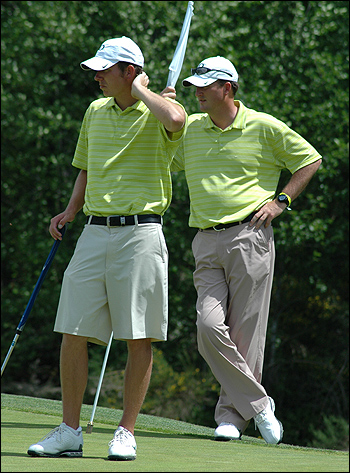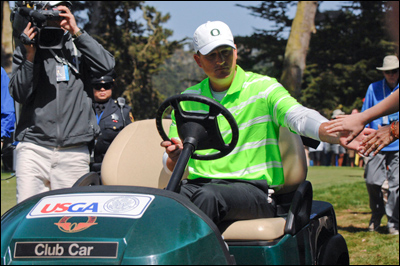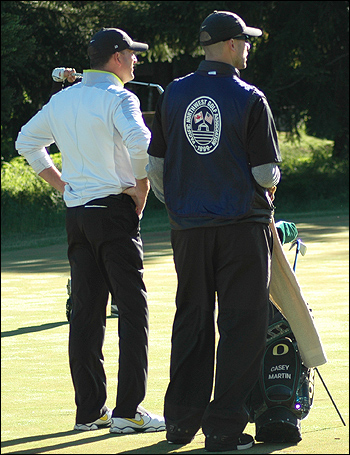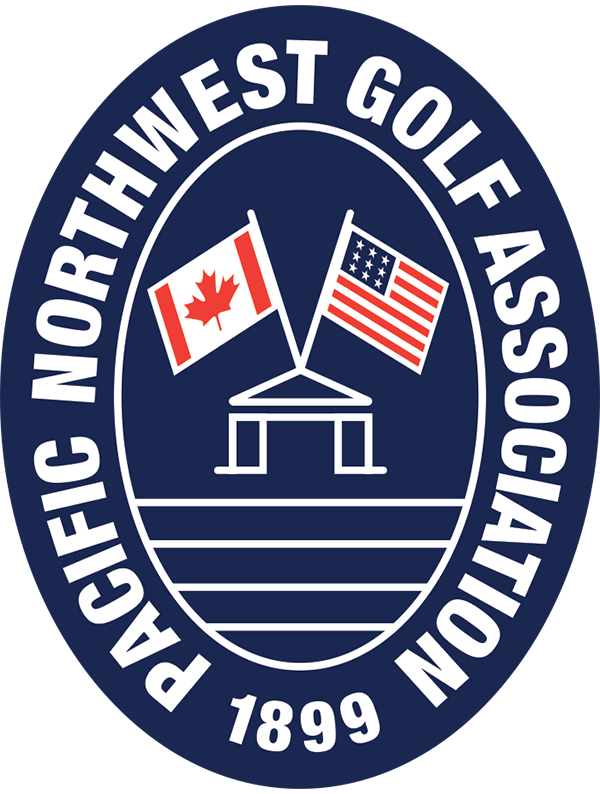Casey Martin’s career has seen highs and lows, and now the biggest high of an NCAA national championship
by Bob Robinson


Casey Martin left the 18th green that spring day in Cincinnati, Ohio, with a look that hinted of heartbreak. A tear ran in a jagged streak down one of his cheeks.
“Not right now,” he said to a group of reporters after signing and turning in his scorecard at Clovernook Country Club. He feared he had just blown a chance to play in the 1998 U.S. Open.
A field of 69 golfers was playing for five spots in the Open and Martin appeared to be a lock to make it after a 3-under-par 67 in the morning round and a steady round of 1-under in the afternoon heading to the 18th hole (his 36th of the day).
Then he messed up.
A drive into trees and failure to get his ball up-and-down from next to the green led to a double-bogey and a 2-under-par finish of 138 for the two rounds.
Martin retreated to a car in the parking lot to be alone. He knew there still might be a chance for him but he figured it was a slim one since four players already had posted scores of 137 or better. He was tied with four others at 138.
But he got his chance as he and the four others went into a playoff for the final Open berth. He won it on the second hole, sinking a double-breaking birdie putt from 25 feet. He was on his way to the 1998 U.S. Open, to be played at the Olympic Club in the San Francisco suburbs.

In a major turn-around from about an hour earlier, Martin was now all smiles. “I was crushed after that double-bogey,” he said. “I had fought so hard and, all of a sudden, it looked as if my score wouldn’t be good enough.”
Joy oozed from his every word even though his manager and a few friends among his fellow pros were the only ones there to celebrate the moment with him.
Martin, of course, went on to play well in the Open, riding a golf cart in his first major event after winning his lawsuit against the PGA Tour for the privilege earlier in the year. He tied for 23rd place, earned $33,961 and expressed delight by the way “people rooted me on” while so much national focus was on him.
That joy for Martin in Cincinnati came to mind after he had an even more fulfilling moment this spring. In his 10th year as University of Oregon men’s golf coach, he led the Ducks to an NCAA Championship, the school’s first in golf, at Eugene Country Club. It also served as a reminder of some emotion-charged highs and some gut-wrenching lows that he has had while making golf a major part of his life.
When UO junior Sulman Raza sank a 6-foot birdie putt on the 21st hole to defeat Texas’ Taylor Funk, the Ducks clinched a 3&2 win over the Longhorns in the title match. Martin joined his players in a wild celebration as more than 3,000 excited spectators looked on. He even was doused by buckets of water by a couple of his players, reminding one of a football sideline.
Then Martin had hugs for all of the Ducks, including sophomore Aaron Wise who had claimed the tournament’s individual championship earlier in the week and was looking ahead to a professional career. That career got a jump start the following week when Wise qualified to play in the 2016 U.S. Open at famed Oakmont Country Club in Pennsylvania.
“Aaron is the best player I’ve coached,” Martin had said even before his team’s late-season run.

The surprising developments at Eugene CC also seemed to suggest an appropriate time to look back on some of those highs and lows of Martin’s life both on and off the golf course.
After determining that golf was the one sport that he could play competitively with a right leg ravaged by a vein and circulation disorder with the official name of Klippel-Trenaunay-Weber Syndrome, he became a standout amateur player. He won both individual and team high school championships at Portland’s Glendoveer Golf Course while a student at South Eugene High. He won the Oregon Amateur in 1993 at Pumpkin Ridge, a year after his brother, Cam, had won the same championship. In 1994, he made holes-in-one on back-to-back days of the Oregon Open on Sunriver (Ore.) Resort’s Woodlands course.
At Stanford, he played on the Cardinal’s NCAA title team of 1994 and on the school’s second-place team of 1995 when Tiger Woods was a teammate.
After turning pro, he won the Lakeland Classic on the then-Nike Tour after Bill Wiswall, his volunteer attorney and family friend, got him a court injunction to ride a cart. There also were coaching accomplishments, including two ties for third in NCAA Championships and conference coach-of-the-year awards.
Most of the lows revolved around pain and agony from his lifelong disability which limited him to few nights of restful sleep. The stressful dispute with the PGA Tour over whether he would be allowed to ride a cart in tour-sanctioned events also took a toll. Some of the criticisms by players such as Arnold Palmer and Jack Nicklaus stung, especially after Wiswall provided them, through tour officials, with his client’s medical records. They declined to even look at them.
The prolonged appeals process before the Supreme Court’s 7-2 vote in his favor in 2001 was frustrating, too. Then, shortly after he earned and lost his PGA Tour card, an infection in his leg became life-threatening in the winter of 2002-03. He had two surgeries followed shortly after by three more surgeries on consecutive days. “It was a brutal experience,” he said. But he came out of it with his usual and amazing positive attitude.
“I know the leg isn’t going to get any better,” he once said. “All I can do is try to live with it the best I can for as long as I can.”
Eventually, the coaching opportunity presented itself and he quickly realized that it was what he described as a “perfect fit,” an opportunity to share his golf knowledge with aspiring young players.
Now back to Eugene CC and that celebration of a national championship. At one point in an interview for Golf Channel, a beaming Martin said, “Oregon has been known as a football school, a basketball school and a track school. Now it also can be known as a golf school.”
Casey Martin had defied the odds. Again.
Bob Robinson started covering golf for The Oregonian in the mid-1960s. He has covered 24 major championships, two Ryder Cups, and more than 30 LPGA Tour events. During his career, he has been named the Oregon Sportswriter of the Year, and has been awarded the Dale Johnson Media Award by the Oregon Golf Association and the Distinguished Service Award by the Northwest Golf Media Association.






